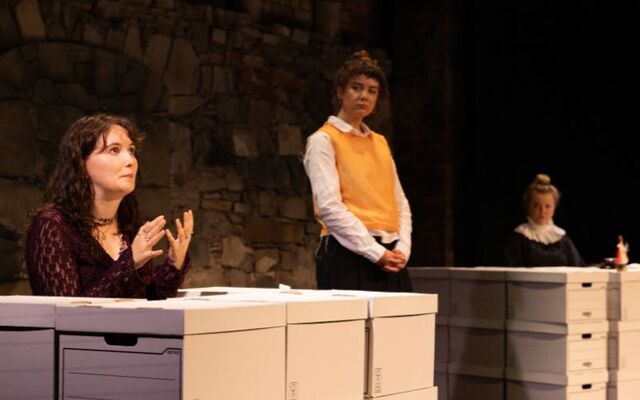Awkward. A recently broken-up couple attends a friend’s wedding, where one notices an expensive gift—her idea—sitting on the table.
Annoyed that her ex had taken her suggestion and signed the card with only his name, she swaps the card to make sure she gets credit. He, equally annoyed, takes her to court—the Court of Public Opinion. The audience is left to decide guilt. It’s a fun case to attend.
Is stealing credit for a gift a crime? In this court, yes. During the trial, the couple’s tangled backstories reveal their justifications.
Using the trappings of a courtroom drama is a clever way to structure an argument that could just as easily play out on social media. The trial format—something the audience knows well—imposes order on what would otherwise descend into chat spirals and nasty exchanges: He said. She said. Oh yeah? Well, you… Chaos and hurt feelings among family and friends.
At the Court of Public Opinion—“Facebook-era justice”—the jury is the audience. They decide the verdict, which also concludes the performance. It feels fitting: guilt over a social misstep would likely be judged by friends anyway.
The proceedings parody real legal principles. The charges? “Grant clout larceny” and “stage two moocher.” Objections are handled by a delightful judge. Litigants take the stand, insisting on innocence while admitting to minor wrongs. Lawyers pontificate about the sanctity of the law, all while eyeing post-trial drinks. Seriousness is always just a wink away.
Playwright Dafe Orugbo cleverly folds in issues of race, wealth, new-age performance, and social etiquette. “Every immigrant parent goes on and on about what they ‘sacrificed’ to come here.” “Class is more than the money in your pocket.” “Be zen. Be zen.” Yet the heart of the conflict remains: acknowledgment for the pricey gift.
Director Joy Nesbitt brilliantly sustains the facade of a trial while letting giddiness bubble beneath, sometimes breaking through. Serious and tender moments sit alongside vaudevillian flights of fancy—even dance breaks. Nesbitt also allows characters to exist outside the courtroom in private conversations, revealing their humanity.
The cast is uniformly excellent, each actor in on the joke: This isn’t a real trial, so let’s have fun. Emily Lagacé (Judge/Olive), Aoife Morgan Jones (Amy May, the accused), Sodiq Ajibola Abiola (Tumi, the defendant), Samuel Coyle (Cormac, the accused’s lead lawyer), Colleen Keogh (Grace, the defendant’s lawyer), and Siomha McQuinn (Fran, the accused’s junior lawyer). McQuinn, in particular, delivers a perfectly unhinged yet hysterical performance that captures the mock trial’s balance of seriousness and satire. Her “weirdness” is a sheer delight.
Set designer Mar Parés Baraldés outdid herself—brilliantly. The design transformed the performance space into a convincing replica of a British(?) courtroom, grounding the illusion. Kudos.
The charade continues as the jury—audience members—reads its verdict and joins the cast for the curtain call, underlining their role in the performance. At my show, the accused was overwhelmingly found guilty on both counts. In true social media fashion: canceled.
And yes—I was guilty of thoroughly enjoying the proceedings.
"Am I The A**hole?" was presented as part of the Urgent Pleasure chapter of the Dublin Fringe Festival at Smock Alley Theatre.




Comments